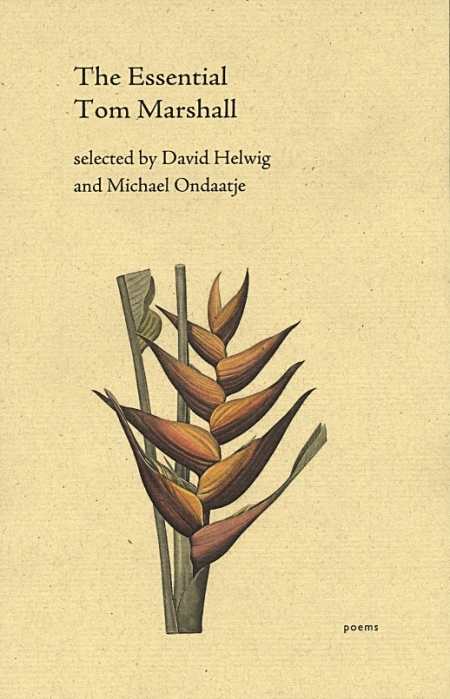The Essential Tom Marshall
In the age of the Internet, more literary works are available to more people than ever before. The problem with this overabundance of riches, which applies to poetry as much as any other genre, is that there isn’t enough time for most individuals to sift through all that’s out there. This increases the value of editors and publishers who can be trusted to separate the wheat from the chaff. With The Essential Tom Marshall, The Porcupine’s Quill has once again shown its ability to select and present the best work of poets whose words might otherwise be lost in the electronic ether.
Tom Marshall died in 1993, leaving a legacy of well-regarded poetry and fiction, and while he may not be Canada’s most prominent 20th century poet, his work fully deserves to be better known. For The Essential Tom Marshall, David Helwig and Michael Ondaatje, two leading figures in Canadian literature, make the selections from the vast body of Marshall’s poetic work, choosing thirty-four representative poems or excerpts. The relatively small number of poems makes the work more digestible, and even though it may not be a comprehensive compendium, The Essential Tom Marshall spans a wide range of topics and forms, as would befit a master craftsman who honed his technique over a lifetime of writing.
In these poems, Marshall lets us view the world through his eyes. Particularly perceptive are his poems about nature and the parks around his hometown. Because this collection spans Marshall’s career, we get to read his reactions to his surroundings in context, like a timeline: “The park is more like a wood” and “Words in Exile,” both from 1969; and then, in 1971, “The Return,” recount his happiness in Canada and his longing for familiar ground when overseas. One of Marshall’s gifts is that in many of his poems, he seems to speak directly to the reader. Conversationally, his poetry is subtle, its rhythms steadily propelling the reader forward, like a boat over gentle waves. At other times, Marshall’s style choices are more direct and forceful, as at the beginning of the excellent poem “Speedboat”: “The machine, many poets / to the contrary, is not / the enemy.”
This short opening stanza can be read different ways, with different meanings, giving it a richness that rewards multiple readings.
Marshall finishes with an elegant final stanza: “For everything we do / is the attempt, blind, / speedblown, to unlock / that fire, that fevering / atom’s flight that makes / forever back / the winged trajectory, / the strenuous and timeless track.”
Marshall also uses repetition in novel forms, as in the poem “Field Syllabics.” The poems presented in The Essential Tom Marshall do justice to Marshall’s skill, and succeed in the book’s stated goal: to “bring Tom back as a living voice.”
Reviewed by
Peter Dabbene
Disclosure: This article is not an endorsement, but a review. The publisher of this book provided free copies of the book and paid a small fee to have their book reviewed by a professional reviewer. Foreword Reviews and Clarion Reviews make no guarantee that the publisher will receive a positive review. Foreword Magazine, Inc. is disclosing this in accordance with the Federal Trade Commission’s 16 CFR, Part 255.

